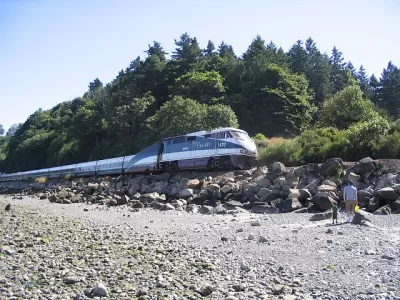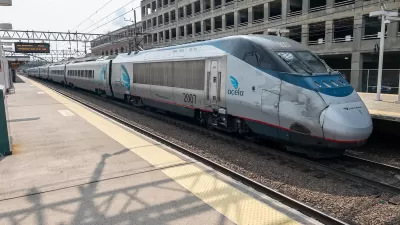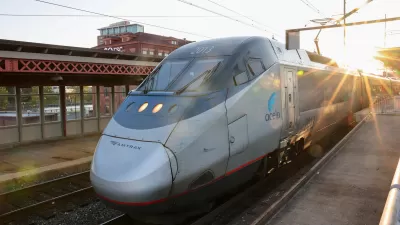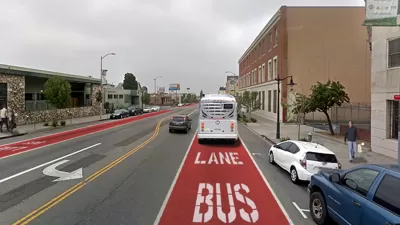Language in the new infrastructure bill calls for the agency to prioritize ridership and service levels over profitability.

"2021 will be a defining moment for the future of passenger rail in America," writes Jake Blumgart. "Amtrak faces huge challenges, but the systemic changes to travel and work life wrought by the pandemic also present an opportunity to fundamentally rethink how the agency operates." Meanwhile, the new infrastructure bill "could allow Amtrak’s executives to make paradigm-shifting operational changes — placing ridership over revenues and faster speeds over minimizing costs."
"In a country where transportation is the largest source of greenhouse emissions, there is no cleaner way to travel than by train." But the business travel that was the lifeblood of Amtrak's Northeast Corridor services "remains severely constrained," and prohibitively expensive fares lead travelers to choose driving instead. Outside of the Northeast Corridor, it isn't the cost but rather "the infrequency and unreliability of the trains that makes Amtrak uncompetitive."
Part of the problem, says Blumgart, is Amtrak's history: "the legislation creating Amtrak specifies that it should be operated and managed as a for-profit service, something that no other country’s rail network requires or accomplishes." According to Amtrak public relations manager Kimberly Woods, "[b]ecause Amtrak is operated as a for-profit company and is required by law to maximize revenues, its fares vary based upon demand, like airlines and intercity buses." The revised mandate proposed in the infrastructure bill "would get rid of the Nixon-era language about minimizing subsidies and instead refocus the agency’s mission on expanding passenger rail capacity and adding ridership," giving it more flexibility to experiment with fare structures. "Just as owners of office buildings and commuter rail lines are being forced to grapple with a new reality, perhaps changes to ridership wrought by the pandemic will force policymakers to change."
FULL STORY: Will Amtrak Make Fares Cheaper as Business Travel Drops?

Planetizen Federal Action Tracker
A weekly monitor of how Trump’s orders and actions are impacting planners and planning in America.

Congressman Proposes Bill to Rename DC Metro “Trump Train”
The Make Autorail Great Again Act would withhold federal funding to the system until the Washington Metropolitan Area Transit Authority (WMATA), rebrands as the Washington Metropolitan Authority for Greater Access (WMAGA).

The Simple Legislative Tool Transforming Vacant Downtowns
In California, Michigan and Georgia, an easy win is bringing dollars — and delight — back to city centers.

The States Losing Rural Delivery Rooms at an Alarming Pace
In some states, as few as 9% of rural hospitals still deliver babies. As a result, rising pre-term births, no adequate pre-term care and "harrowing" close calls are a growing reality.

The Small South Asian Republic Going all in on EVs
Thanks to one simple policy change less than five years ago, 65% of new cars in this Himalayan country are now electric.

DC Backpedals on Bike Lane Protection, Swaps Barriers for Paint
Citing aesthetic concerns, the city is removing the concrete barriers and flexposts that once separated Arizona Avenue cyclists from motor vehicles.
Urban Design for Planners 1: Software Tools
This six-course series explores essential urban design concepts using open source software and equips planners with the tools they need to participate fully in the urban design process.
Planning for Universal Design
Learn the tools for implementing Universal Design in planning regulations.
Smith Gee Studio
City of Charlotte
City of Camden Redevelopment Agency
City of Astoria
Transportation Research & Education Center (TREC) at Portland State University
US High Speed Rail Association
City of Camden Redevelopment Agency
Municipality of Princeton (NJ)





























